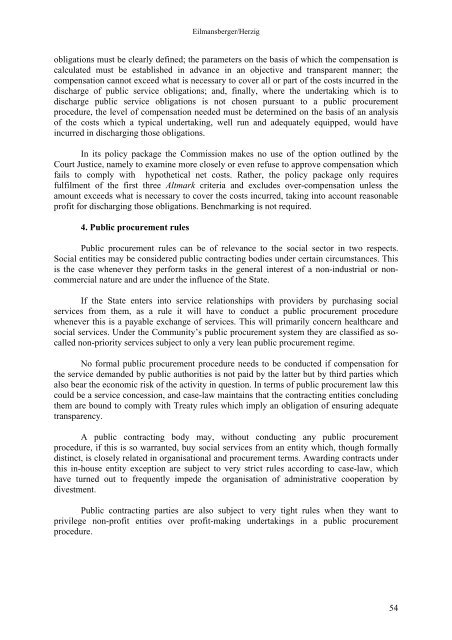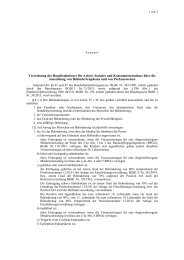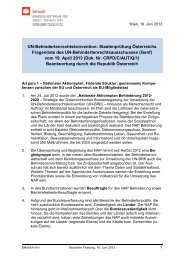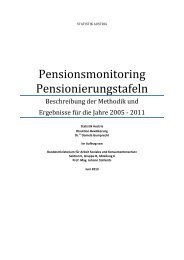Social Services of General Interest (SSGI)
Social Services of General Interest (SSGI)
Social Services of General Interest (SSGI)
Create successful ePaper yourself
Turn your PDF publications into a flip-book with our unique Google optimized e-Paper software.
Eilmansberger/Herzig<br />
obligations must be clearly defined; the parameters on the basis <strong>of</strong> which the compensation is<br />
calculated must be established in advance in an objective and transparent manner; the<br />
compensation cannot exceed what is necessary to cover all or part <strong>of</strong> the costs incurred in the<br />
discharge <strong>of</strong> public service obligations; and, finally, where the undertaking which is to<br />
discharge public service obligations is not chosen pursuant to a public procurement<br />
procedure, the level <strong>of</strong> compensation needed must be determined on the basis <strong>of</strong> an analysis<br />
<strong>of</strong> the costs which a typical undertaking, well run and adequately equipped, would have<br />
incurred in discharging those obligations.<br />
In its policy package the Commission makes no use <strong>of</strong> the option outlined by the<br />
Court Justice, namely to examine more closely or even refuse to approve compensation which<br />
fails to comply with hypothetical net costs. Rather, the policy package only requires<br />
fulfilment <strong>of</strong> the first three Altmark criteria and excludes over-compensation unless the<br />
amount exceeds what is necessary to cover the costs incurred, taking into account reasonable<br />
pr<strong>of</strong>it for discharging those obligations. Benchmarking is not required.<br />
4. Public procurement rules<br />
Public procurement rules can be <strong>of</strong> relevance to the social sector in two respects.<br />
<strong>Social</strong> entities may be considered public contracting bodies under certain circumstances. This<br />
is the case whenever they perform tasks in the general interest <strong>of</strong> a non-industrial or noncommercial<br />
nature and are under the influence <strong>of</strong> the State.<br />
If the State enters into service relationships with providers by purchasing social<br />
services from them, as a rule it will have to conduct a public procurement procedure<br />
whenever this is a payable exchange <strong>of</strong> services. This will primarily concern healthcare and<br />
social services. Under the Community’s public procurement system they are classified as socalled<br />
non-priority services subject to only a very lean public procurement regime.<br />
No formal public procurement procedure needs to be conducted if compensation for<br />
the service demanded by public authorities is not paid by the latter but by third parties which<br />
also bear the economic risk <strong>of</strong> the activity in question. In terms <strong>of</strong> public procurement law this<br />
could be a service concession, and case-law maintains that the contracting entities concluding<br />
them are bound to comply with Treaty rules which imply an obligation <strong>of</strong> ensuring adequate<br />
transparency.<br />
A public contracting body may, without conducting any public procurement<br />
procedure, if this is so warranted, buy social services from an entity which, though formally<br />
distinct, is closely related in organisational and procurement terms. Awarding contracts under<br />
this in-house entity exception are subject to very strict rules according to case-law, which<br />
have turned out to frequently impede the organisation <strong>of</strong> administrative cooperation by<br />
divestment.<br />
Public contracting parties are also subject to very tight rules when they want to<br />
privilege non-pr<strong>of</strong>it entities over pr<strong>of</strong>it-making undertakings in a public procurement<br />
procedure.<br />
54

















